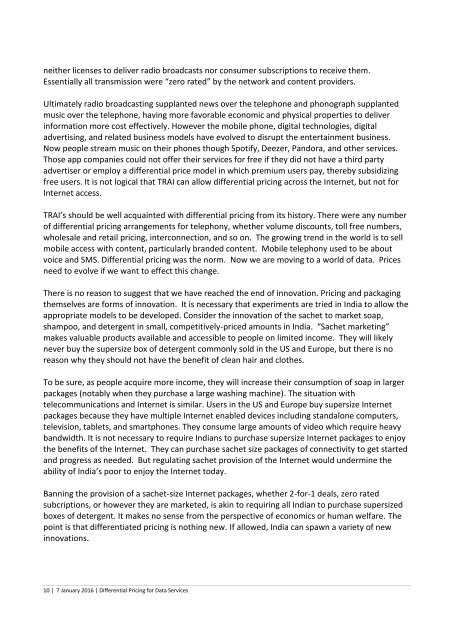Layton
Layton
Layton
You also want an ePaper? Increase the reach of your titles
YUMPU automatically turns print PDFs into web optimized ePapers that Google loves.
neither licenses to deliver radio broadcasts nor consumer subscriptions to receive them.<br />
Essentially all transmission were “zero rated” by the network and content providers.<br />
Ultimately radio broadcasting supplanted news over the telephone and phonograph supplanted<br />
music over the telephone, having more favorable economic and physical properties to deliver<br />
information more cost effectively. However the mobile phone, digital technologies, digital<br />
advertising, and related business models have evolved to disrupt the entertainment business.<br />
Now people stream music on their phones though Spotify, Deezer, Pandora, and other services.<br />
Those app companies could not offer their services for free if they did not have a third party<br />
advertiser or employ a differential price model in which premium users pay, thereby subsidizing<br />
free users. It is not logical that TRAI can allow differential pricing across the Internet, but not for<br />
Internet access.<br />
TRAI’s should be well acquainted with differential pricing from its history. There were any number<br />
of differential pricing arrangements for telephony, whether volume discounts, toll free numbers,<br />
wholesale and retail pricing, interconnection, and so on. The growing trend in the world is to sell<br />
mobile access with content, particularly branded content. Mobile telephony used to be about<br />
voice and SMS. Differential pricing was the norm. Now we are moving to a world of data. Prices<br />
need to evolve if we want to effect this change.<br />
There is no reason to suggest that we have reached the end of innovation. Pricing and packaging<br />
themselves are forms of innovation. It is necessary that experiments are tried in India to allow the<br />
appropriate models to be developed. Consider the innovation of the sachet to market soap,<br />
shampoo, and detergent in small, competitively-priced amounts in India. “Sachet marketing”<br />
makes valuable products available and accessible to people on limited income. They will likely<br />
never buy the supersize box of detergent commonly sold in the US and Europe, but there is no<br />
reason why they should not have the benefit of clean hair and clothes.<br />
To be sure, as people acquire more income, they will increase their consumption of soap in larger<br />
packages (notably when they purchase a large washing machine). The situation with<br />
telecommunications and Internet is similar. Users in the US and Europe buy supersize Internet<br />
packages because they have multiple Internet enabled devices including standalone computers,<br />
television, tablets, and smartphones. They consume large amounts of video which require heavy<br />
bandwidth. It is not necessary to require Indians to purchase supersize Internet packages to enjoy<br />
the benefits of the Internet. They can purchase sachet size packages of connectivity to get started<br />
and progress as needed. But regulating sachet provision of the Internet would undermine the<br />
ability of India’s poor to enjoy the Internet today.<br />
Banning the provision of a sachet-size Internet packages, whether 2-for-1 deals, zero rated<br />
subcriptions, or however they are marketed, is akin to requiring all Indian to purchase supersized<br />
boxes of detergent. It makes no sense from the perspective of economics or human welfare. The<br />
point is that differentiated pricing is nothing new. If allowed, India can spawn a variety of new<br />
innovations.<br />
10 | 7 January 2016 | Differential Pricing for Data Services


